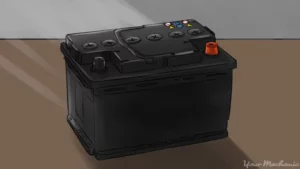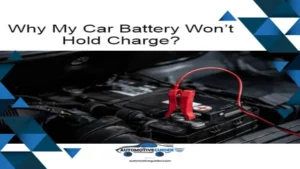Picture this: you’re in a hurry to leave the house and realize that your car battery is dead. The last thing you need is more delays, but now you’re faced with a dilemma – it’s pouring down with rain outside. Can you still use your car battery charger in the rain? The short answer is yes, but there are some important precautions you’ll need to take to ensure your safety and the proper functioning of your charger.
So, if you’re facing a similar situation, read on to find out how you can charge your car battery in the rain without any mishaps.
Understanding Water Resistance Ratings
When it comes to using a car battery charger in the rain, the answer isn’t a simple yes or no. It largely depends on the water resistance rating of the charger and whether it’s designed for outdoor use. Most car battery chargers have some level of water resistance, typically indicated by an IP (Ingress Protection) rating.
If your charger has an IP rating of 65 or higher, it should be able to withstand heavy rain and splashing water without any issues. However, if your charger doesn’t have a high enough IP rating or isn’t designed for outdoor use, it’s best to avoid using it in the rain. Water can damage the charger and cause electrical hazards, so always prioritize safety when it comes to charging your car battery.
Explaining IP Ratings
If you’re in the market for a new electronic gadget, you may have come across the term “IP rating” or “water resistance rating.” But what do these ratings actually mean, and how do they relate to water resistance? The IP rating system is a standard measure of how resistant something is to water and dust. It’s based on two numbers: the first number refers to dust resistance, while the second number refers to water resistance.
The higher the number for each category, the greater the level of protection. For example, an IP68 rating means that the device is completely dust-tight and can be submerged in water for extended periods of time without damage. This can be especially important for devices that will be used in wet or dirty environments, such as smartphones, watches, or cameras.
So, if you’re planning on using your gadget near water or in dusty conditions, look for a high IP rating to ensure it can handle the elements.
Differentiating Between Ingress Protection Ratings
When it comes to water resistance ratings, it can be confusing to understand the different levels of protection that are available. Ingress protection (IP) ratings are used to specify the level of protection offered by electronic devices against the intrusion of water and dust. The first digit of an IP rating refers to the level of dust protection, while the second digit indicates the degree of water-resistance.
Water-resistant devices with a rating of IPX7 can withstand being submerged in water for up to 30 minutes, while those with a rating of IPX8 can withstand more prolonged immersion. It’s important to carefully consider the intended use of a device before choosing the appropriate level of water resistance. Whether you’re looking for a waterproof phone for outdoor activities or a water-resistant watch for everyday use, understanding water resistance ratings can help you make more informed purchasing decisions.
Safety Precautions for Using a Car Battery Charger in the Rain
If you’re wondering whether you can use a car battery charger in the rain, the answer is yes, but with some precautions. Rain can cause damage to electronic devices and can be potentially hazardous if proper safety measures are not taken when using a car battery charger. The first step is to ensure that the charger is specifically designed for outdoor use and is rated for water resistance.
It’s also crucial to check that the charger is not placed on wet ground and that the connection between the charger and battery is not exposed to water. Before using the charger, it’s also important to inspect all cords and adapters to ensure there is no wear or damage. Remember to keep any loose cables or wires away from any water as well.
By taking these precautions, using a car battery charger in the rain will be safe and successful.
Avoiding Electrical Shock
If you need to use a car battery charger in the rain, it’s important to take some extra safety precautions to avoid electrical shock. First, make sure that the battery and charger are in a dry location to prevent any water from getting into the electrical components. If you cannot find a dry area, use a tarp or umbrella to protect yourself and the charger while you work.
Additionally, wear rubber gloves and boots to insulate yourself from the ground, which can conduct electricity from the charger. Finally, be careful when handling the battery and charger, and don’t touch any metal components or wires with wet hands or tools. By taking these safety measures, you can safely charge your car battery even in inclement weather conditions.
Protecting the Charger from Water
When it comes to using a car battery charger while it’s raining, safety should always be the top priority. The best way to protect the charger from water is to use a weather-resistant model that’s designed specifically for outdoor use. However, if you’re using a standard charger, you should make sure to place it on a dry surface, away from any puddles or moist areas.
It’s also vital to wear rubber gloves and rubber-soled shoes while handling the charger to reduce the risk of electrocution. Another way to safeguard the charger is to use a waterproof cover or tarp to shield it from raindrops and moisture. Additionally, never leave the charger unattended while it’s plugged in, and always disconnect it from the power source before cleaning or servicing it.
By following these safety precautions, you can use a car battery charger in the rain with peace of mind, knowing that you’ve taken the necessary steps to protect both yourself and the equipment.
Ensuring Proper Ventilation
If you plan on using a car battery charger in the rain, it’s crucial to take safety precautions to avoid any dangerous situations. First and foremost, ensure that the charger and battery are located in a dry area. Water can damage the charger and, in some cases, cause electrical shock.
Additionally, check that the charger is designed to withstand wet conditions and has proper ventilation to prevent overheating. Proper ventilation is essential to prevent heat buildup and ensure the charger operates safely and efficiently. When operating the charger, make sure to keep the plug and outlets dry, and avoid touching the charger with wet hands.
By taking the necessary precautions, you can use a battery charger safely in the rain without putting yourself or your equipment in danger.
Tips for Using a Car Battery Charger in the Rain
When it comes to using a car battery charger in the rain, there are a few things you should keep in mind. Firstly, it’s important to remember that while some car battery chargers are designed to be weather-resistant, this doesn’t mean that they’re completely waterproof. You should always check the product specifications before using the charger in the rain to make sure that it’s designed to withstand outdoor use.
Secondly, you should take precautions to ensure that the charger and all of its components stay dry while in use. This might mean setting up a tent or canopy to protect the charger, or simply positioning it under an overhang or in a garage. Lastly, it’s important to use the charger safely and follow the manufacturer’s instructions to avoid any accidents or damage to your vehicle.
So, can you use a car battery charger in the rain? Yes, but it’s important to take the necessary precautions and use it safely to protect both you and your vehicle.
Choosing the Right Charger
When it comes to using a car battery charger in the rain, there are a few tips you need to keep in mind to ensure safety and optimal performance. First and foremost, it’s important to choose a charger that is specifically designed for wet conditions and is waterproof. This will prevent any potential damage to the charger and ensure that it continues to function properly.
Additionally, make sure that the charger is placed in a dry and sheltered area during use, such as under a covered porch or in a garage. Finally, be sure to follow all safety precautions and instructions provided by the manufacturer to avoid any accidents or mishaps. By taking these simple steps, you can safely and effectively use a car battery charger in the rain and keep your vehicle’s battery working at its best.
Positioning the Charger Correctly
When using a car battery charger in the rain, it’s crucial to position it correctly to prevent any accidents or damage. The first rule is to avoid placing the charger on wet surfaces. Find a dry location under a shelter or canopy and ensure the charger is on an elevated surface to avoid any contact with water.
Additionally, avoid positioning the charger near any puddles or water sources that could cause a short circuit or electrocution. It’s also essential to double-check that all connections are secure and dry before turning on the charger. The keyword “car battery charger in the rain” is essential to ensure that your battery charger works effectively during adverse weather conditions.
Remember, electricity and water don’t mix, and safety should always come first when using any electrical equipment.
Conclusion
While it may seem tempting to use a car battery charger in the rain for convenience, it’s important to remember that water and electricity don’t mix. Even if the charger is designed to be weatherproof, there is still a risk of electric shock and damage to the device. So, unless you fancy taking an unexpected dip in your car battery, it’s best to keep the charger under cover and wait for clearer skies to recharge your battery.
“
FAQs
Is it safe to use a car battery charger in the rain?
It is not recommended to use car battery chargers in the rain because it can cause electrocution or short circuit.
Can I protect my car battery charger from the rain?
Yes, you can protect your car battery charger from the rain by using a waterproof cover or placing it in a dry and protected area.
What should I do if my car battery charger gets wet?
If your car battery charger gets wet, do not touch it and unplug it immediately. Allow it to dry completely before using it again.
Can a wet car battery charger damage my car battery?
Yes, a wet car battery charger can damage your car battery as it can cause a short circuit or overload the battery.
What are the safety precautions when using a car battery charger?
The safety precautions when using a car battery charger include keeping it away from water or damp areas, using protective gloves, and avoiding touching the charger’s metal parts.
How long does it take to charge a car battery with a charger?
The time it takes to charge a car battery with a charger depends on the battery’s size and age. Generally, it takes between 4 to 24 hours.
Can a car battery charger overcharge my battery?
Yes, a car battery charger can overcharge your battery if it is left connected for too long. This can cause damage to the battery, and in some cases, it can even explode.






